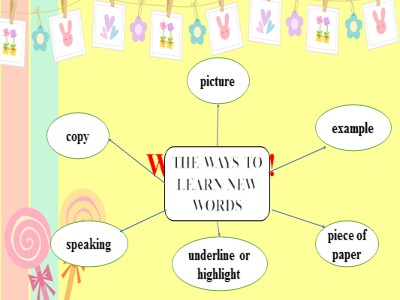Bài giảng Tiếng anh Lớp 8 (Chương trình cũ) - Unit 5: Study habits (Read) - Năm học 2017-2018

Language learners learn words in different ways. Some learners make a list and put into it the meanings of new words in their mother tongue, and try to learn them by heart. However, others do not. Instead, they write one or two example sentences with each new word in order to remember how to use the word in the right way.
In order to remember words better, some learners even write each word and its use on a piece of paper and stick it somewhere in their house so as to learn it at any time.
Many language learners do not try to learn all new words they come across. They usually underline or highlight only the words they want to learn. This helps them remember important words.
There are also different ways of learning the same number of words. For example, if you try to learn ten words in two days, you can do so in two ways. You can learn the first five words the first day and then learn the other five the next day. However, because revision is necessary, you can learn all the ten words the first day and revise them the next day. This helps you practice the words more times.
Language learners should try different ways of learning words so as to find out the best way for themselves. Ask yourself the question: how should I learn words?
WARM UP!THE WAYS TO LEARN NEW WORDSpictureexampleunderline or highlightcopypiece of paperspeakingThursday, October 19th ,2017UNIT 5: STUDY HABITSLESSON: READNEW WORDS:Learn (v) -> learner:Make a list :Mother tongueLearn by heart(v)Instead( adv):Piece of paper:Stick(v)Underline(v)Highlight(v):Revise (v) -> revision:Practice(v)UNIT 5: STUDY HABITSLESSON: READHọc -> người học Lập danh sáchVietnamese is mother tongueTiếng mẹ đẻHọc thuộc lòngI go to school by bike instead on footMẩu giấyThay vìDánGạch chânTô đậm, làm nổi bậtLook at again and againXem lại -> sự xem lạiThực hànhmatching1.Learn (v) -> learner:2.Make a list :3.Mother tongue4.Learn by heart(v)5.Instead(adv):6.Piece of paper:7.Stick(v):8.Underline(v):9.Highlight(v):10.Revise (v) -> revision:11.Practice(v):a. Xem lại-> sự xem lạib. thực hànhc. dánd. tô đậme. gạch chânf. mẩu giấyg.ngôn ngữ mẹ đẻh.thay vìj.học thuộc lòngk. học -> người họcl.lập danh sáchUNIT 5: STUDY HABITSLESSON: READGuess statements true or falsestatementsTF1. All language learners write the meaning of new words in their mother tongue2. Some learners write examples of words they want to learn.3. Every learner tries to learn all new words they come across.4. Many learners only learn new words that are importantUNIT 5: STUDY HABITSLESSON: READreadingLanguage learners learn words in different ways. Some learners make a list and put into it the meanings of new words in their mother tongue, and try to learn them by heart. However, others do not. Instead, they write one or two example sentences with each new word in order to remember how to use the word in the right way.In order to remember words better, some learners even write each word and its use on a piece of paper and stick it somewhere in their house so as to learn it at any time.Many language learners do not try to learn all new words they come across. They usually underline or highlight only the words they want to learn. This helps them remember important words.UNIT 5: STUDY HABITSLESSON: READThere are also different ways of learning the same number of words. For example, if you try to learn ten words in two days, you can do so in two ways. You can learn the first five words the first day and then learn the other five the next day. However, because revision is necessary, you can learn all the ten words the first day and revise them the next day. This helps you practice the words more times. Language learners should try different ways of learning words so as to find out the best way for themselves. Ask yourself the question: how should I learn words? UNIT 5: STUDY HABITSLESSON: READstatementsTF1. All language learners write the meaning of new words in their mother tongue2. Some learners write examples of words they want to learn.3. Every learner tries to learn all new words they come across.4. Many learners only learn new words that are importantUNIT 5: STUDY HABITSLESSON: READCheck and correct the false sentencesDo notsomeLucky stars123456789AB1. Do learners learn words in the same way?a. Yes they dob. No they don’t050403020100START2. Why do some learners write example sentences with new words?A. Because they want to remember how to use the word in the right way.B. Because they want to try to learn them by heart .050403020100START3. What do some learners do in order to remember words better?B. Some learners make a list and put into it the meanings of new words in their mother tongue.A. some learners even write each word and its use on a piece of paper and stick it.050403020100START4. Why don’t some learners learn all the new words they come across?A. Because they don’t have enough time to learn.B. Because they need to remember important words.050403020100START5. What is necessary in learning words?A. revision B. past050403020100STARTUNIT 5: STUDY HABITSLESSON: READAnswer the questions How should you learn words?UNIT 5: STUDY HABITSLESSON: READSHOULD / SHOULDN’THOMEWORK:Write a paragraph about your learning new words.Learn new words by heart.Prepare a new lesson.
Tài liệu đính kèm:
 bai_giang_tieng_anh_lop_8_chuong_trinh_cu_unit_5_study_habit.pptx
bai_giang_tieng_anh_lop_8_chuong_trinh_cu_unit_5_study_habit.pptx



